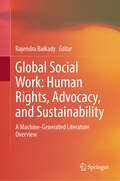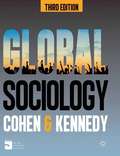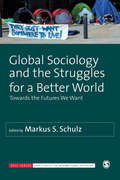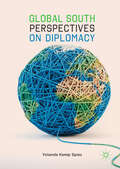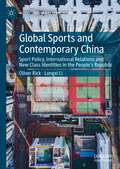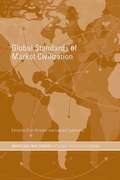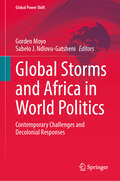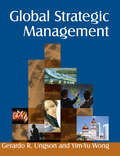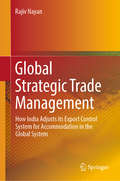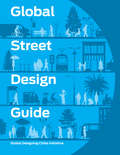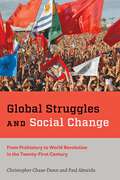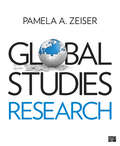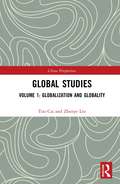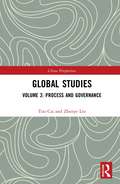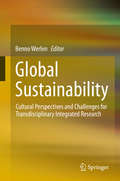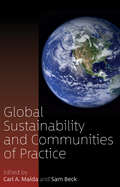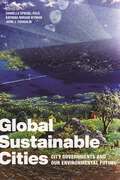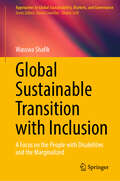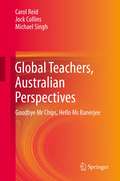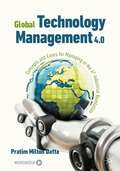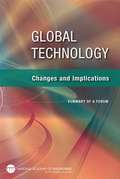- Table View
- List View
Global Social Work: A Machine-Generated Literature Overview
by Rajendra BaikadyThis book is a product of human-machine collaboration in social work and is a premier in global social work education and practice. Each chapter is organized by the book editor with a human-written introduction. Chapters focus on contemporary issues, providing an updated, comprehensive and in-depth understanding of the latest developments in the field of social work, including social work with marginalized communities, social work and social policy, social work and human rights, social work advocacy, social activism, social work and sustainability. It offers comprehensive literature on global social work, its challenges and future directions. Chapters in this book help readers understanding contemporary debates, discussions and insights on global social work and its growth and development. The book is immensely useful for scholars studying social work, policy, welfare, exclusion and inclusion, sociology and other social science discipline. It is equally valuable to undergraduate and postgraduate social work students across all educational institutions without boundaries. The auto-summaries have been generated by a recursive clustering algorithm via the Dimensions Auto-summarizer by Digital Science. The editor of this book selected which Springer Nature content should be auto-summarized and decided its order of appearance. Please be aware that these are extractive auto-summaries, which consist of original sentences, but are not representative of its original paper, since we do not show the full length of the publication. Please note that only published SN content is represented here, and that machine-generated books are still at an experimental stage.
Global Sociology
by Paul Kennedy Robin CohenGlobal Sociology is the authority on global issues in contemporary society, introducing key sociological topics, themes and debates from a consistently global point of view. Deep connections are made between the "everyday" and globalization processes, with focus on how individuals perceive, react to or cope with incoming global forces and incorporate them into their private worlds. Global Sociology: offers strong coverage of contemporary topics, such as intimacy, financial sociology and the environment takes an unbiased approach which encourages critical thinking, optimism, and social consciousness provides an explicitly sociological focus alongside political, cultural, economic and anthropological perspectives, highlighting how concepts from these disciplines interact. The new edition has been thoroughly updated to include: discussions of recent topics and events such as the recession, new uses of social media, the Arab Spring and the Occupy movement new sections on finance and economic sociology, family, technology, and the environment more in-depth debate on sociological theory and discussion of key sociological terms a new "A pause to reflect" feature which encourages students to engage critically with chapter content. Global Sociology has been streamlined and restructured to better suit teaching needs and to strengthen linkages between similar themes throughout.
Global Sociology and the Struggles for a Better World: Towards the Futures We Want (SAGE Studies in International Sociology)
by Dr Markus S. SchulzThe contemporary world has reached a pivotal moment of escalating injustices and apocalyptic risks, but also of unprecedented opportunities. Mounting pressures of social and ecological problems are met by a confluence of intellectual trends that allow the questioning of entrenched assumptions and the unleashing of a forward-oriented sociological imagination. In Global Sociology and the Struggles for a Better World, a diverse collection of regional experts explore contemporary trends, alternative visions, and new directions for sociological research, raising issues that reflect the complexity of challenges facing future projects on a shared planet. Topics include: Feminist and Indigenous Perspectives in Latin America An African-centred approach to Knowledge Production Post-Islamist Democracy Based on the revised papers of the Opening and Closing Plenaries of the Third ISA Forum of Sociology in Vienna, Austria, July 2016, which Markus Schulz organized on the theme “The Futures We Want: Global Sociology and the Struggles for a Better World.”
Global Sociology and the Struggles for a Better World: Towards the Futures We Want (SAGE Studies in International Sociology)
by Dr Markus S. SchulzThe contemporary world has reached a pivotal moment of escalating injustices and apocalyptic risks, but also of unprecedented opportunities. Mounting pressures of social and ecological problems are met by a confluence of intellectual trends that allow the questioning of entrenched assumptions and the unleashing of a forward-oriented sociological imagination. In Global Sociology and the Struggles for a Better World, a diverse collection of regional experts explore contemporary trends, alternative visions, and new directions for sociological research, raising issues that reflect the complexity of challenges facing future projects on a shared planet. Topics include: Feminist and Indigenous Perspectives in Latin America An African-centred approach to Knowledge Production Post-Islamist Democracy Based on the revised papers of the Opening and Closing Plenaries of the Third ISA Forum of Sociology in Vienna, Austria, July 2016, which Markus Schulz organized on the theme “The Futures We Want: Global Sociology and the Struggles for a Better World.”
Global South Perspectives on Diplomacy
by Yolanda Kemp SpiesThis volume is a comprehensive overview of the various methods used in contemporary diplomatic practice. It incorporates the traditional modes of diplomacy and explains how these modes have evolved to deal with a burgeoning international community of state and non-state actors, the information and communications revolution and the changing profile of global conflict. The pursuit of “development diplomacy” is an integral part of the project, with due attention to the fault-lines, microcosms of power-politics and rapid evolution within the society of states that make up the Global South. All chapters are extensively illustrated with recent case examples from across the world.
Global Sports Fandom in South Korea: American Major League Baseball and Its Fans in the Online Community (Palgrave Series of Sport in Asia)
by Younghan ChoThis book explores the transformation of cultural and national identity of global sports fans in South Korea, which has undergone extensive cultural and economic globalization since the 1990s. Through ethnographic research of Korean Major League Baseball fans and their online community, this book demonstrates how a postcolonial nation and its people are developing long-distance affiliation with American sports accompanied by nationalist sentiments and regional rivalry. Becoming an MLB fan in South Korea does not simply lead one to nurturing a cosmopolitan identity, but to reconstituting one’s national imaginations. Younghan Cho suggests individuated nationalism as the changing nature of the national among the Korean MLB fandom in which the national is articulated by personal choices, consumer rights and free market principles. The analysis of the Korean MLB fandom illuminates the complicated and even contradictory procedures of decentering and fragmenting nationalism in South Korea, which have been balanced by recalling nationalism in combination with neoliberal governmentality.
Global Sports and Contemporary China: Sport Policy, International Relations and New Class Identities in the People’s Republic (Global Culture and Sport Series)
by Oliver Rick Longxi LiThis book examines the formation of a globally oriented sports system in China, from the beginning of the reform process in 1978 to the present, focusing on the period after the Beijing 2008 Olympic Games. It analyses how this system has shaped domestic social class identities and its role in international Chinese state politics. Despite advances in the marketization of the sports industry through previous eras, the Chinese state expanded investment in a set of global sports following the heavily government-directed drive towards national success at the 2008 Beijing Summer Olympic Games. This would be a time when the government focused on policies set to service a growing domestic middle-class and an increasingly wide-ranging set of international interests, with sporting investments being at the heart of their strategic plan. However, reform has proven difficult. The book presents a well-rounded account of this effort with tennis and soccer providing important case studies of the internal and external dynamics of this time. As such, the book will be of interest to researchers and students of globalization of sport, those studying East Asian sports development, and those who are interested in understanding China more broadly.
Global Standards of Market Civilization (RIPE Series in Global Political Economy)
by Brett Bowden Leonard SeabrookeGlobal Standards of Market Civilization brings together leading scholars, representing a range of political views, to investigate how global 'standards of market civilization' have emerged, their justification, and their political, economic and social impact. Key chapters show how as the modern state system has evolved such standards have also developed, incorporating the capacity for social cooperation and self-government to which states must conform in order to fully participate as legitimate members in international society. This study analyzes their justification, and their political, economic and social impact. Civilization is a term widely used within modern political discourse its meaning, yet it is poorly understood and misused. part I explores the idea of a ‘standard of civilization’, its implications for governance, and the use of such standards in political theory and economic thought, as well as its historical application part II presents original case studies that demonstrate the emergence of such standards and explore the diffusion of liberal capitalist ideas through the global political economy and the consequences for development and governance; the International Monetary Fund’s capacity to formulate a global standard of civilization in its reform programs; and problems in the development of the global trade, including the issue of intellectual property rights. This book will be of strong interest to students and scholars in wide range of fields relating to the study of globalization including: international political economy; international political theory; international relations theory; comparative political economy; international law; historical sociology; and economic history.
Global Storms and Africa in World Politics: Contemporary Challenges and Decolonial Responses (Global Power Shift)
by Sabelo J. Ndlovu-Gatsheni Gorden MoyoAfrica provides a unique perspective to understand today's global crises. This book explores how Africa, positioned historically in a subaltern role due to colonialism, offers a critical lens on the shifting dynamics of the modern world system. The book presents how Africa's continued struggles against racism, colonialism, and economic exploitation make it a powerful site for rethinking the global order. Addressing ecological, ideological, financial, health, and systemic crises, the book demonstrates how problems in Africa are intrinsically linked to global issues. It argues that the so-called decolonization after 1945 was superficial, maintaining global hierarchies that marginalize Africa. With insights from thinkers like Nkrumah and Rodney, it challenges the entrenched structures of racial capitalism and offers new pathways for genuine global equity and justice. This book will appeal to students, scholars, and researchers of international relations, economics, political science, and related disciplines, as well as policy-makers interested in a better understanding of the ongoing global power shift and Africa's challenges and position within the modern world system.
Global Strategic Management
by Gerardo R. Ungson Yim-Yu WongInternational business is undergoing continuous transformation as multinational firms and comparative management evolve in the changing global economy. To succeed in this challenging environment, firms need a well-developed capability for sound strategic decisions. This comprehensive work provides an applied and integrated strategic framework for developing capabilities that lead to global success. It is designed to help readers achieve three essential objectives. First, it provides intellectual and practical guidelines for readers to execute goals and strategies that lead to meaningful and productive results. The book is packed with frameworks, cases, anchoring exercises, techniques, and tools to help readers emerge with a completed business plan after the last chapter. Second, it focuses on strategy and how firms build competitive presence and advantages in a global context. A primary learning objective is to enable readers to understand and evaluate the major issues in strategy formulation and implementation in a global context. Third, it provides an accessible framework that will help guide readers in making strategic decisions that are sound and effective. It offers a unifying process that delineates the necessary steps in analyzing the readiness of a firm to do business abroad. In addition to core issues, each chapter presents frameworks, analytical tools, action-oriented items, and a real-world case - all designed to provide insights on the challenges imposed by globalization and technology on managers operating in a global context.
Global Strategic Trade Management: How India Adjusts its Export Control System for Accommodation in the Global System
by Rajiv NayanThis book examines whether India is successfully integrating and adapting to the global strategic management system. It offers essential insights into the evolution of export controls for goods, which may have implications for the development of Weapons of Mass Destruction – an aspect that is especially relevant given India’s robust biotechnological, chemical and nuclear industrial base. In security studies, the phrase “strategic trade management” is now slowly replacing the phrase “export control”. However, for the policymaking community, export control remains popular, at least for the sake of reference.The book also describes the mechanisms India is adopting in this regard. It demonstrates the shift in the Indian approach to strategic trade management, from an outspoken critic to a supporter. Politically, the country was initially skeptical of the idea of export controls because it was a target of such systems. The book also explains the tools, forces and incentives that moved India to adapt its policy on export controls or strategic trade management.
Global Street Design Guide
by National Association of City Transportation Officials Global Designing Cities InitiativeEach year, 1.2 million people die from traffic fatalities, highlighting the need to design streets that offer safe and enticing travel choices for all people. Cities around the world are facing the same challenges as cities in the US, and many of these problems are rooted in outdated codes and standards.TheGlobal Street Design Guideis a timely resource that sets a global baseline for designing streets and public spaces and redefines the role of streets in a rapidly urbanizing world. The guide will broaden how to measure the success of urban streets to include: access, safety, mobility for all users, environmental quality, economic benefit, public health, and overall quality of life. The first-ever worldwide standards for designing city streets and prioritizing safety, pedestrians, transit, and sustainable mobility are presented in the guide. Participating experts from global cities have helped to develop the principles that organize the guide. TheGlobal Street Design Guidebuilds off the successful tools and tactics defined in NACTO'sUrban Street Design Guideand UrbanBikeway Design Guidewhile addressing a variety of street typologies and design elements found in various contexts around the world.This innovative guide will inspire leaders, inform practitioners, and empower communities to realize the potential in their public space networks. It will help cities unlock the potential of streets as safe, accessible, and economically sustainable places.Example cities include: Bangalore, India; Buenos Aires, Argentina; Paris, France; Copenhagen, Denmark; Seoul, Korea; Medellin, Colombia; Toronto, Canada; Istanbul, Turkey; Auckland, New Zealand; Melbourne, Australia; New York, USA; and San Francisco, USA.
Global Struggles and Social Change: From Prehistory to World Revolution in the Twenty-First Century
by Paul Almeida Christopher Chase-DunnDeftly demonstrates how the rise and fall of social movements throughout history is closely linked to economic and political developments.In the early decades of the twenty-first century, an international movement to slow the pace of climate change mushroomed across the globe. The self-proclaimed Climate Justice movement urges immediate action to reduce carbon emissions and calls for the adoption of bold new policies to address global warming before irreversible and catastrophic damage threatens the habitability of the planet. On another front, since the 1980s, multiple waves of resistance have occurred around the world against the uneven transition from state-led development to the neoliberal globalization project. Both Climate Justice and Anti-Austerity movements represent the urgency of understanding how global change affects the ability of citizens around the world to mobilize and protect themselves from planetary warming and the loss of social protections granted in earlier eras.In Global Struggles and Social Change, Christopher Chase-Dunn and Paul Almeida explore how global change stimulates the formation and shape of such movements. Contending that large-scale economic shifts condition the pattern of social movement mobilizations around the world, the authors trace these trends back to premodern societies, revealing how severe disruptions of indigenous communities led to innovative collective actions throughout history. Drawing on historical case studies, world system and protest event analysis, and social networks, they also examine the influence of global change processes on local, national, and transnational social movements and explain how in turn these movements shape institutional shifts. Touching on hot-button topics, including global warming, immigrant rights protests, the rise of right-wing populism, and the 2008 financial crisis, the book also explores a broad range of premodern social movements from indigenous people in the Americas, Mesopotamia, and China. The authors pay special attention to periods of disruption and external threats, as well as the role of elites, emotions, charisma, and religion or spirituality in shaping protest movements. Providing sweeping coverage, Global Struggles and Social Change is perfect for students and anyone interested in globalization, international and comparative politics, political sociology, and communication studies.
Global Studies Research
by Pamela A. ZeiserGlobal Studies Research is a research methods textbook designed for interdisciplinary International Studies majors and their faculty. The textbook introduces interdisciplinarity, provides basic building blocks of relevant disciplinary knowledge, explains a process for integrating knowledge from multiple disciplines, and models this interdisciplinary International Studies Research Process in its presentation of the case studies.
Global Studies Research
by Pamela A. ZeiserGlobal Studies Research is a research methods textbook designed for interdisciplinary International Studies majors and their faculty. The textbook introduces interdisciplinarity, provides basic building blocks of relevant disciplinary knowledge, explains a process for integrating knowledge from multiple disciplines, and models this interdisciplinary International Studies Research Process in its presentation of the case studies.
Global Studies: Volume 1: Globalization and Globality (China Perspectives)
by Tuo Cai Zhenye LiuSince the 1950s, globalization has been an increasingly irresistible trend and one that has exerted a tremendous impact on the political, economic, military, environmental, and social fortunes of mankind – and yet, the existing theories in humanities and social sciences have been fundamentally built upon the traditional “nation-state” model. These two volumes, a pioneering work on global studies to be published out of China, aims at creating a new theoretical framework against the backdrop of globalization. This volume introduces core concepts and critical issues, deploying globalization as a theoretical framework and redefining the interrelationship between politics, economics, law, and globality. The two volumes are an essential reference for scholars and students in politics, economics, international relations, and law.
Global Studies: Volume 2: Process and Governance (China Perspectives)
by Tuo Cai Zhenye LiuSince the 1950s, globalization has been an increasingly irresistible trend and one that has exerted a tremendous impact on the political, economic, military, environmental, and social fortunes of mankind – and yet, existing theories in humanities and social sciences have been fundamentally built upon the traditional “nation-state” model. These two volumes, a pioneering work on global studies to be published out of China, aim at creating a new theoretical framework against the backdrop of globalization. This volume discusses globalization on the supranational level. The editors reveal the complexity of global studies by examining the multi-level and multi-dimensional nature of globalization, analyzing processes and systems of global society against the backdrop of globalization, and exploring the construction of a stable and rational global order. These two volumes are an essential reference for scholars and students in politics, economics, international relations, and law.
Global Sustainability
by Benno WerlenThis book offers new perspectives of transdisciplinary research, in methodological as well as theoretical respects. It provides insights in the two-fold bio-physical and the socio-cultural global embeddedness of local living conditions on the basis of selected empirical studies from Latin America, Asia, Africa, Australia and Europe. The theoretical foundations of ecological research and sustainability policies were developed at the end of the nineteenth century. They are largely based on investigations of living spaces and the evolution and differentiation of varied life forms. This perspective is embedded in the practical and theoretical European problem situations of the past and lacks social and cultural differentiation. The transformation of spatial and natural relations as a result of the globalization process is so radical that new theories are needed to solve 21st century ecological problems. Moreover, in view of the lack of an ontologically sound and promising strategy for transdisciplinary problem solving, as well as an acceptable consideration of the power of cultural schemas relating to natural living's interpretations, there is a strong need to focus on sustainable social practices, habits and routines, rather than on predominantly living spaces or eco-topes. This book elaborates on the transdisciplinary approach by reflecting on the theoretical heritage and a global perspective of sustainability, by focusing on the primary role of a social approach in sustainability research and by putting emphasis on cultural dimension of sustainability. It postulates that global sustainability is grounded in a global understanding of our everyday activities.
Global Sustainability and Communities of Practice
by Carl A. Maida Sam BeckCollaboration between experts and the public is vital for effective community engagement aimed at improving the lives of the most vulnerable in society, whether at the local or global level. Using case-based and theoretical chapters that examine rural and urban communities of practice, this volume illustrates how participatory researchers and students, as well as policy and community leaders, find ways to engage with the broader public when it comes to global sustainability research and practice.
Global Sustainable Cities: City Governments and Our Environmental Future
by Danielle Spiegel-Feld, Katrina Miriam Wyman, and John J. CoughlinPerspectives from worldwide experts on how major cities across the globe are responding to the major environmental threats of our time, including global climate change Over half of the world’s population now lives in cities, and this share is expected to increase in the coming decades. With growing urbanization, cities and their residents face substantial environmental challenges such as higher temperatures, droughts, wildfires, and increased flooding. In response to these pressing challenges, some cities have begun to develop local environmental regulations that supplement national and environmental laws. In so doing, cities have stepped into a role that has been historically dominated by higher levels of government.Global Sustainable Cities takes stock of the policies that have been implemented by cities around the world in recent years in several key areas: water, air pollution, greenhouse gas emissions, and climate adaptation. It examines the advantages—and potential drawbacks—of allowing cities to assume a significant role in environmental regulation, given the legal and political constraints in which cities operate.The contributors present a series of case studies of the actions that seven leading cities—Abu Dhabi, Beijing, Berlin, Delhi, London, New York, and Shanghai—are taking to improve their environments and adapt to climate change. The first volume of its kind, Global Sustainable Cities is a critical comparative assessment of the actions that major cities in the global North and South are taking to advance sustainability.
Global Sustainable Transition with Inclusion: A Focus on the People with Disabilities and the Marginalized (Approaches to Global Sustainability, Markets, and Governance)
by Wasswa ShafikThis book provides a comprehensive exploration of inclusive, sustainable development, emphasizing the critical need to integrate the perspectives and needs of people with disabilities and marginalized communities into the global sustainability transition to a sustainable future. Through highlighting the intersectionality of identity and the unique challenges faced by these groups, the book addresses a pressing issue: the often-overlooked barriers that hinder their full participation in sustainable transitions. Organized into three parts, the book first contextualizes the relationship between sustainability and inclusion. It delves into the historical and theoretical frameworks that shape our understanding of marginalization, exploring how disability intersects with various social identities. This foundation sets the stage for an in-depth analysis of the United Nations Sustainable Development Goals (SDGs) and the ways in which they can be made more inclusive, ensuring that no one is left behind. The second part identifies and examines the myriad barriers to inclusion within sustainable practices. It addresses structural, socioeconomic, and cultural obstacles that perpetuate exclusion while also critiquing existing policy frameworks for their limitations in addressing the needs of marginalized populations. Through case studies, the book highlights successful initiatives and innovative practices that promote accessibility and equity, mainly through the use of assistive technologies and community engagement. In the final section, the book outlines actionable strategies for fostering inclusive, sustainable development. It emphasizes the importance of community engagement, participatory decision-making, and the empowerment of marginalized voices. Additionally, it discusses metrics for monitoring and evaluating the impact of sustainability initiatives on people with disabilities, providing a framework for accountability and continuous improvement. This book aims to bridge the gap between sustainability and social justice, offering a roadmap for stakeholders, policymakers, and practitioners committed to creating a more inclusive world. This book targets academics, policymakers, non-profit societies, and activists working at the intersection of sustainability and social equity and serves as a vital resource for those seeking to understand and promote inclusive practices in the global sustainable transition.
Global Talent: Skilled Labor as Social Capital in Korea
by Gi-Wook Shin Joon Nak ChoiGlobal Talent seeks to examine the utility of skilled foreigners beyond their human capital value by focusing on their social capital potential, especially their role as transnational bridges between host and home countries. Gi-Wook Shin and Joon Nak Choi build on an emerging stream of research that conceptualizes global labor mobility as a positive-sum game in which countries and businesses benefit from building ties across geographic space, rather than the zero-sum game implied by the "global war for talent" and "brain drain" metaphors. The book empirically demonstrates its thesis by examination of the case of Korea: a state archetypical of those that have been embracing economic globalization while facing a demographic crisis-and one where the dominant narrative on the recruitment of skilled foreigners is largely negative. It reveals the unique benefits that foreign students and professionals can provide to Korea, by enhancing Korean firms' competitiveness in the global marketplace and by generating new jobs for Korean citizens rather than taking them away. As this research and its key findings are relevant to other advanced societies that seek to utilize skilled foreigners for economic development, the arguments made in this book offer insights that extend well beyond the Korean experience.
Global Teachers, Australian Perspectives: Goodbye Mr Chips, Hello Ms Banerjee
by Michael Singh Jock Collins Carol ReidThis is the first book on global teachers and the increasingly important phenomenon of 'brain circulation' in the global teaching profession. A teaching qualification is a passport to an international professional career: the global teacher is found in more and more classrooms around the world today. It is a two-way movement. This book looks at the growing importance of immigrant teachers in western countries today and at teachers who exit from western countries (emigrant teachers) seeking teaching experience in other countries. Drawing on the international literature in Europe, North America, Asia and elsewhere supplemented by rich insights derived from recent Australian research, the book outlines the personal, institutional and structural processes nationally and internationally underlying the increasing global circulation of teachers. It identifies the key drivers of global teacher mobility: a range of factors including family, lifestyle, classroom experience, travel, opportunities for advancement, discipline, linguistic skills, taxation rates, cultural factors and institutional frameworks and policy support. The book is the first detailed contemporary account of the experiences of Australian immigrant and emigrant teachers in the schools and communities where they teach and live. It makes an important and original theoretical and empirical contribution to the contemporary fields of sociology of education and immigration studies.
Global Technology Management 4.0: Concepts and Cases for Managing in the 4th Industrial Revolution
by Pratim Milton DattaTechnology is pervasive in today’s globalized world. Moreover, technology and globalization drive competitiveness and strategy, and must be managed well. This textbook uses technology management as the central theme to cover multiple business and social facets, including digital transformation, cybersecurity, international operations, marketing, finance, culture, human capital, and the political economy. The book is divided into four sections. Part 1 examines the confluence of globalization and technology from the first Industrial Revolution to the current Fourth Industrial Revolution. Part 2 introduces strategic and analytical metrics and models that are crucial to managerial decision-making. Part 3 discusses the basics of cybersecurity and combating cyber-threats to protect organization and its stakeholders. Part 4 focuses on sustainable operations, global projects, and digital transformation in a technology-centric, globalized world. The book will help students learn how to navigate business aspects of globalization and technology in the 4th Industrial Revolution (4IR). For instructors, the learning objectives and discussion questions help guide students in grasping the material.
Global Technology: Summary of a Forum
by Steve OlsonBeginning JavaScript with DOM Scripting and Ajax is an essential resource for modern JavaScript programming. This completely updated second edition covers everything you need to know to get up-to-speed with JavaScript development and add dynamic enhancements to web pages, right from the basics. As well as focusing on client-side JavaScript, you will also learn how to work with the Browser Object Model, the Document Object Model (DOM), how to use XML and JSON as well as communicate with service side scripts such as PHP. Find out how to: Construct good JavaScript syntax following modern coding practices Use JavaScript to communicate with the server and retrieve data Dynamically manipulate markup, validate forms and deal with images Debug applications using features inside the browser JavaScript is one of the most important technologies on the web. It provides the means to add dynamic functionality to your web pages and serves as the backbone of Ajax-style web development. Beginning JavaScript with DOM Scripting and Ajax will take you from being a JavaScript novice to work freely with this important technology - begin your JavaScript journey today! What you'll learn What functions, variables, events and objects are and how to use them. How build a site that will still work in the case that JavaScript is turned off. How to access and update part of the page using code. How to use JavaScript to communicate with the server and retrieve data. How to use JavaScript to for form validation and user feedback. How to use Third-Party Libraries like jQuery. Who this book is for Beginning JavaScript with DOM Scripting and Ajax is for the person who has a good grasp of HTML and CSS but wants to add JavaScript to their skillset. If you want to learn some basic programming concepts, have experience but need help updating your skills, or you're coming from another language, Beginning JavaScript with DOM Scripting and Ajax can help. Table of Contents Getting Started with JavaScript Data and Decisions From DHTML to DOM Scripting HTML5 and JavaScript Presentation and Behavior (CSS and Event Handling) Common Uses of JavaScript: Image and Windows JavaScript and User Integration: Navigation and Forms Back-End Interaction with Ajax and Node. js Data Validation Techniques Modern JavaScript Case Study: A Dynamic Gallery Using Third-Party JavaScript Appendix A: Debugging JavaScript
